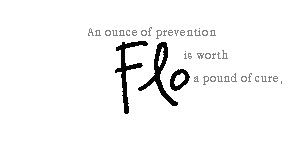Pin It
I've had some really great questions this week. I'll try to answer them the best I know how. You may want to check my
disclaimer before taking my word for it...just sayin. But then again, you may want to check
Flo Who? to see where I'm coming from. :)
Calories vs. Fat Grams
Do you recommend counting fat and calories, or is just the calories enough to lose weight? -Shellie
Despite all the claims out there, weight loss comes down to one thing: calories in calories out. At the same time, it is also true that each gram of fat provides more than twice as many calories as a gram of protein or carbohydrate. This is why high fat foods are also high in calories.
Here is the lowdown for energy (or calories):
-Proteins and carbohydrates=4 calories/gram
-Fats=9 calories/gram.
-Alcohol= 7 calories a gram (this may explain the freshman 15...kinda funny
Regardless of where they come from, the calories we eat are (1) either converted to physical energy or (2) stored within the body as fat. These stored calories will remain in the body as fat unless we use them up, either by reducing calorie intake so that our body must draw on reserves for energy, or by increasing physical activity so that we burn more calories.
I hope this isn't too descriptive, but it helps me to explain. If I were going to count anything, it would definitely be calories, but making sure to keep your fat intake below 30% of total calories. For example, if you are eating 1200 calories to lose weight, then you should consume no more than 360 calories from fat, or40 grams. This is what is recommended by the American Dietetic Association. If you are eating a well balanced diet that includes grains, fruit, vegetables, lean meat, milk, and good fats, then you should be safe in counting only calories.
The problem with counting fat grams alone is that many food items that claim they are "low in fat" or "fat-free" are really higher in calories, many of them compensating with sugar or sugar substitutes. I will admit that counting fat grams can be easier than calories, but its just not enough. Something interesting to know is that in all of the people I have counseled, those who counted calories found the most success. It won't take long before you are a walking calorie counter! And remember, never go below 1200 calories. Great Question Shello!
Resting Heart Rate and Maximum Burn
What if during exercise my heart rate is too high? -Olivia
When it comes to heart rate, it is best to manually test (two fingers to the throat for 10 seconds then multiply by 6). Unfortunately, machine heart rate monitors are not very accurate. But if you are still finding that your heart rate is very high, it is important to listen carefully to your body. If you feel light-headed, for example, you are probably working too hard. With this said, I have done a little research with ACSM (American College of Sports Medicine, the gold standard for exercise science) and have discovered an even better formula than the typical "220 minus your age" formula of yesterday. To determine your max heart rate, follow this simple and more accurate formula:
(210 - age) - (5% of your body weight in pounds) - (+4 for men or 0 for women)=
your max heart rate (MHR)!
Now lets determine where your heart rate should be in order to get the maximum amount of fat burn:
*Level 1 (just starting out, easing into exercise): 50-60% of MHR
*Level 2 (gradually increases your cardiovascular endurance): 60-70%
*Level 3 (this is where you want to spend most of your time): 70-80%
*Level 4 (not for the "faint of heart"): 80-90%
Once you have established a strong and gradual cardio base, stay at Level 4 for about 15% of your training time. This will help you burn the greatest amount of calories in the shortest amount of time. Plus there is the afterburn effect with interval training. Great question Olivia!
I do have more questions to answer, but I think this is enough for now! If you have additional questions or comments, do not hesitate to ask. I may post them in the next "Your Questions Answered" segment!



No comments:
Post a Comment